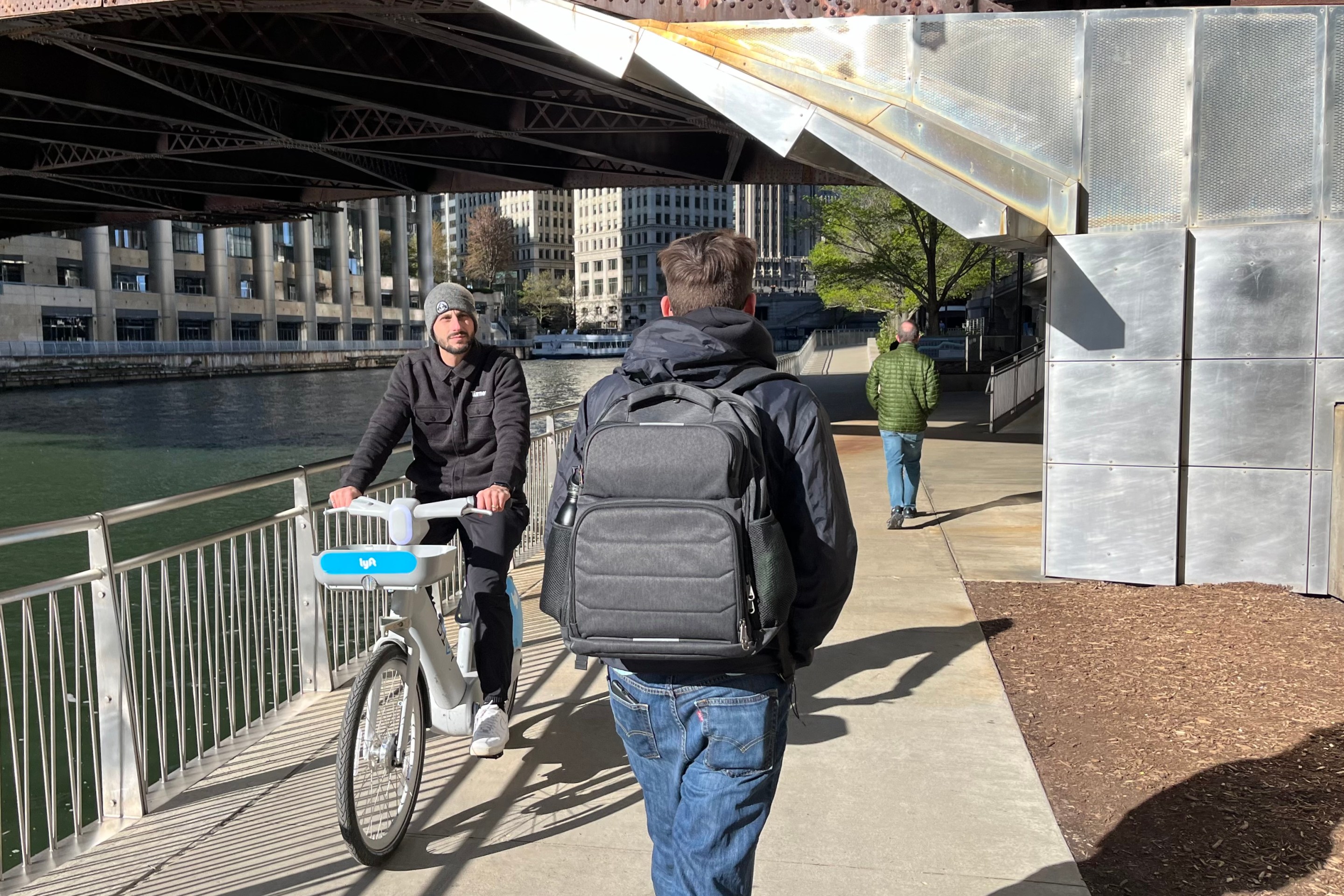Advocates: RTA must overcome “bureaucratic anxiety,” prescribe bold action to save transit
6:02 PM CST on February 22, 2022
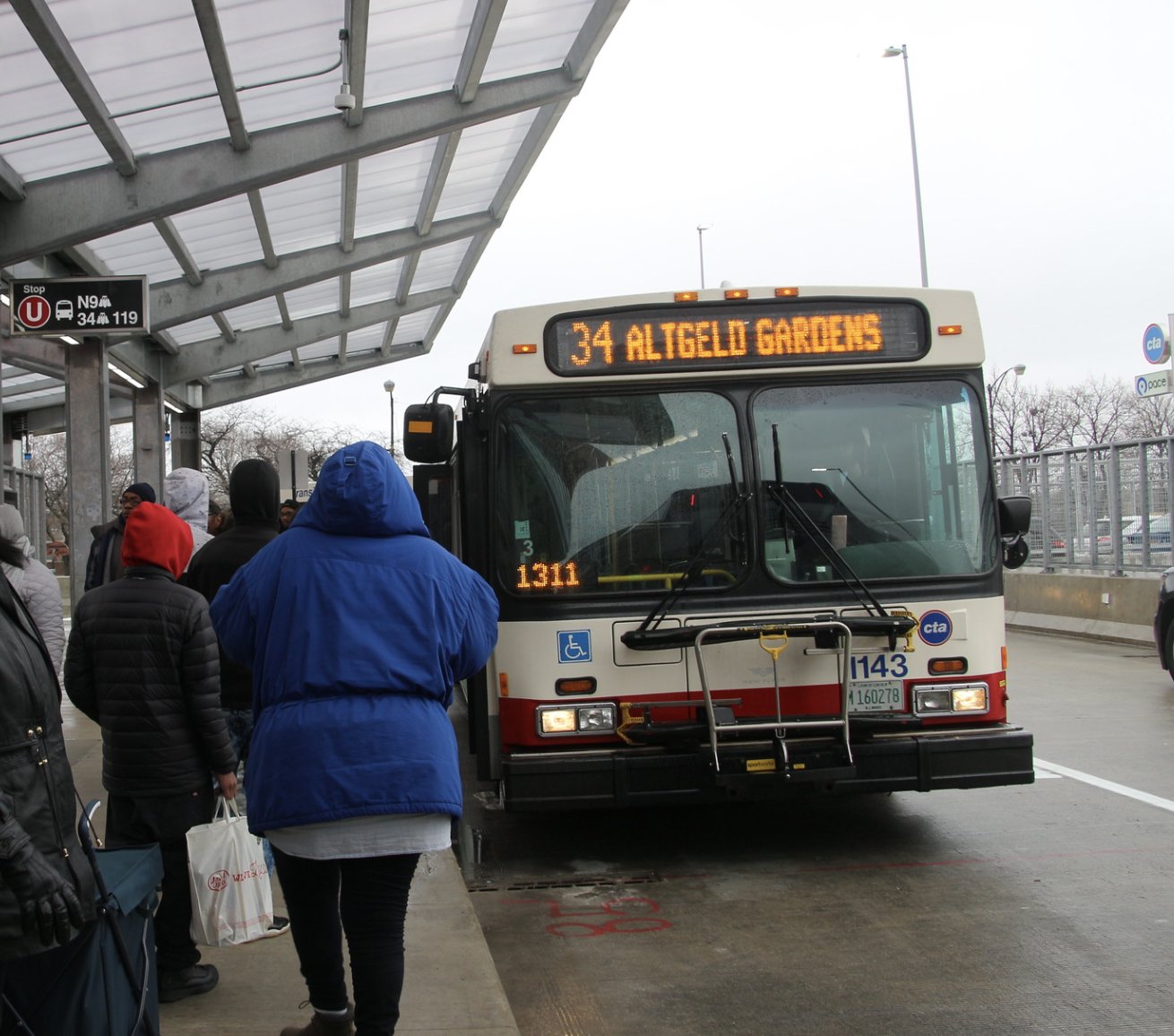
Catching a bus from the 95th/Dan Ryan Red Line station to the Altgeld Gardens housing project. Photo: Jeff Zoline
Update 2/23/22, 2 PM: After the publication of this piece, RTA spokesperson Tina Smith provided the following statement:
We are continuing to evolve [the 2023 Regional Transit Strategic Plan], the vision, and the process based on the feedback we are receiving so it is very important to get the word out so that people can impact this process.
One of our goals with the strategic planning engagement is to help people understand the challenges the system faces across the region. Ultimately, we need to build a broad coalition to tackle those challenges and that coalition building can be difficult as we communicate with and bring together folks with different goals and levels of expertise – we certainly understand why those with deep expertise feel frustrated by that, but we feel like we and our stakeholders are up to that task. We pledge to continue to listen to feedback and work to improve based on it.
On February 14, seven local transportation advocacy organizations sent a message to the Regional Transportation Authority, but it wasn't a Valentine's Day card. Rather, it was a letter warning that the RTA – which oversees planning and funding for the CTA, Pace, and Metra – has been falling short in its efforts to create a 2023 Regional Transit Strategic Plan that will adequately address the existential threats currently facing Chicagoland transit.
Last year the RTA began working on the document, which will set out the agency’s vision for post-pandemic public transportation. During a panel in November, executive director Leanne Redden noted that COVID-19 forced local transit agencies to innovate quickly, something they should continue to do as the health crisis abates, especially in light of the passage of the federal infrastructure bill.
“The task before us is to grow the spirit of innovation and bring longer-lasting change to the transit system,” Redden said. “We understand that transit is a great equalizer, and it’s an irreplaceable piece of our mobility system, and enables [movement] in the ways and the scale that [nothing] else can.”
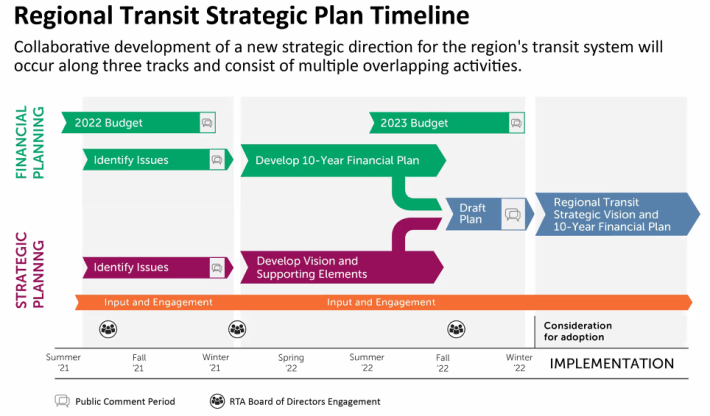
However, the letter from the seven advocacy groups says the RTA is failing in this task, and is instead creating a vague, non-innovative plan that won't address the urgent need to preserve and grow ridership and make Chicagoland transit more equitable. The signees include the Active Transportation Alliance, the Center for Neighborhood Technology, Elevated Chicago, the Environmental Law & Policy Center, the High Speed Rail Alliance, the Metropolitan Planning Council, and the Shared-Use Mobility Center.
At last Thursday's RTA board meeting, the letter was read into the record by Center for Neighborhood Technology vice president of government affairs Jacky Grimshaw. She's a veteran transit official and advocate widely considered a grand dame of the local sustainable transportation scene.
"Our organizations have been invited to participate in the development of this plan, but over the past year we still have not seen any serious effort to address the existing and imminent challenges facing our transit system," the letter states. "This plan, and the process to develop it, needs to meet the needs of this historic moment and, to date, it has not."
The memo said that on January 26, the RTA gathered more than a hundred stakeholders for a “Strategic Plan Workshop,” including many people with great experience and expertise dealing with thorny transit finance and policy challenges. "Instead of using their valuable time to elicit meaningful reaction to serious policy choices, participants were treated as little more than a focus group to test marketing messages around transit." Ouch.
According to the letter, workshop participants (as well as respondents to a survey for the plan, open through March 11) were asked "to choose between a transit system that is fiscally stable and one that addresses climate change... [which is] a false choice and a wasted opportunity."
Other complaints from the advocacy groups included "a clear lack racial diversity in the group and among staff and facilitators" at the workshop; poor planning and presentations for the event; and a proposed vision statement and principles for the strategic plan with "language [that] is so broad, nondescript, and void of local context that it lacks meaning."
The RTA's proposed vision statement for the document is "Safe, reliable, accessible public transportation that connects people to opportunity, empowers equity, and combats climate change." The proposed principals are "1. Open to change 2. Equity 3. Stewardship."
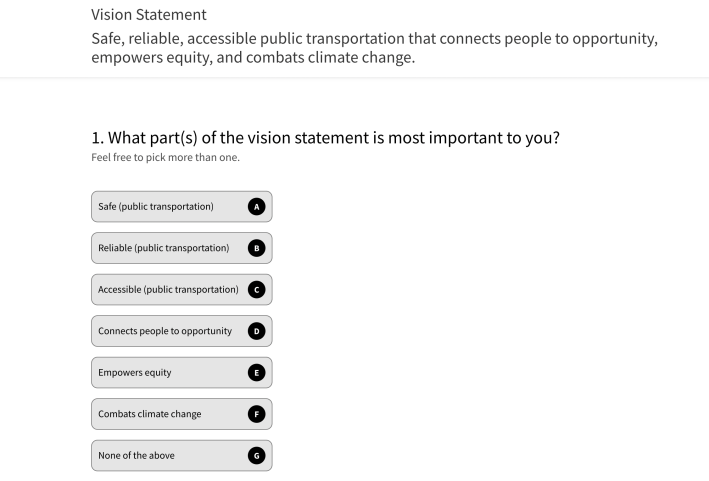
The memo says the advocacy groups were especially troubled that the RTA repeatedly used the phrase that the agency is "open to change" [emphasis added], rather than acknowledging that preserving the status quo is not an option, due to "the urgent need to change in order for transit to survive." The organizations noted that regional transit ridership is at best only back to 60 percent of normal levels, but public transportation is more essential than ever, especially for Black and Latino communities and transit-dependent demographics like low-income residents, young people, seniors, and people with disabilities.
The organizations also pointed out that the CTA, Metra, and Pace have have been able to maintain decent service during the crisis (although things have been getting worse recently due to labor shortages) thanks to infusions of emergency cash from the federal government. However, they said, "This emergency funding will expire and we need a plan to address that uncertain and serious future."
"Nine months into the planning process, stakeholders should be discussing real and difficult decisions, including how to plan transit services given long term ridership uncertainty; choices over farebox and tax revenues to support transit; what equity measures should guide our regional investments; and governance of our disparate transit services," the letter states. "Transformational ideas may be controversial, but that is not an excuse to avoid them. We cannot allow bureaucratic anxiety to lock the region’s transit system into doomsday scenarios of emergency service shutdowns, financial fights between the service boards, and uncertainty for millions of people and businesses."
The letter calls for "serious engagement from RTA with the public and the communities that depend on transit the most." It also exhorts the agency to check out the planning process recently undergone by Chicago’s Equitable Transit Oriented Development Working Group and the Chicago Metropolitan Agency for Planning's COVID Mobility Recovery Steering Committee.
"To date, the engagement around your plan has been lacking and when it has happened, it has concentrated only on high-level platitudes regarding transit," the letter concludes. "The public already agrees transit is essential to [Chicagoland's] well-being, is an important part of our fight against climate change, and necessary for businesses and economic growth. What we need now are serious and specific proposals to maintain those foundational roles transit plays."
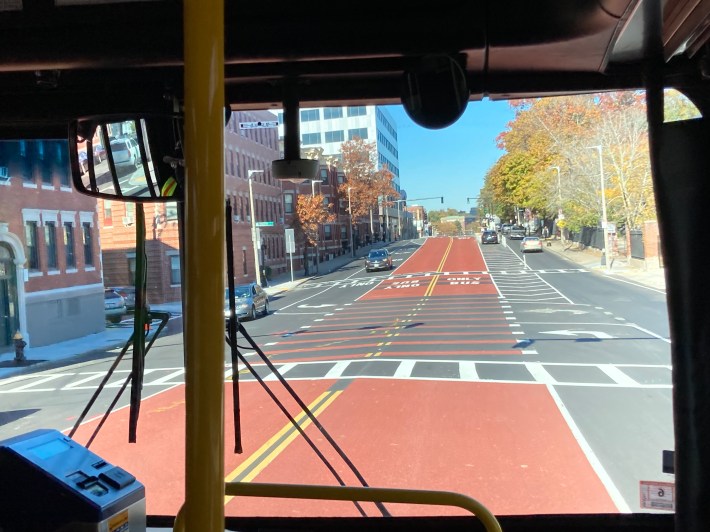
Here's one "transformational idea" the RTA should consider prescribing as a strategy to increase ridership and better serve transit-dependent populations. Boston is providing free service on three bus routes that largely serve communities of color and low-income residents, with center-running bus lanes in place or planned to shorten travel times. Chicago should try this approach on high-ridership corridors that serve the South and West sides, like 79th Street, Chicago Avenue, and Western Avenue.
In addition to editing Streetsblog Chicago, John writes about transportation and other topics for additional local publications. A Chicagoan since 1989, he enjoys exploring the city on foot, bike, bus, and 'L' train.
Stay in touch
Sign up for our free newsletter
More from Streetsblog Chicago
Johnson appoints one West Side pastor to CTA board, then nominates another West Side pastor for RTA board
Supporters argue that, despite his lack of transit expertise, Ira Acree’s social justice experience and political connections could be an asset for the RTA board.
Today’s Headlines for Thursday, April 26
The de-facto ban on riverwalk biking is back. What should we do about it?
In the short term, new signage is needed to designate legal areas for cycling on the path. In the long term CDOT should build the proposed Wacker Drive protected bike lane.



